11 things you’d forgotten about 1994
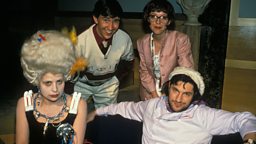
1994 was a year of cultural sea change. Even as we were mourning the loss of Kurt Cobain, a new wave of homegrown musicians were emerging to challenge the dominance of American rock and rap - not just indie disco favourites Blur, Oasis and Elastica but also the more eclectic sounds of Portishead, Goldie and Underworld.
The Day Today and The Fast Show provided us with a rich seam of new catchphrases while a stammering Hugh Grant won the nation’s hearts. John Travolta and Woody Harrelson were reborn as edgy cult heroes, and a strutting Eric Cantona led Manchester United to the double. The opening of the channel tunnel made it easier than ever to get to Europe, while the emergence of the world wide web offered a glimpse into a fully-connected world.
That was the headline news. But there was a lot going on in 1994 besides - not all of it fitting the emerging ‘Cool Britannia’ narrative. Here are some of the year’s cultural ephemera that you might have forgotten.
1. Glasto’s TV debut
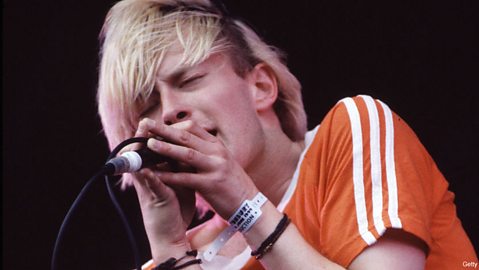
Glastonbury 1994 - Listen to highlights
Listen back to Glastonbury 1994, including Andy Kershaw's interview with Johnny Cash and performances from Orbital, Pulp, Manic Street Preachers, Oasis, Blur, Ride, The Lemonheads, Beastie Boys and Radiohead.
Hard to believe now, but there was a time when most people had no clue what went on at Glastonbury beyond the vague idea that hippies and mud were involved. It wasn’t until 1994 that Channel 4 opted to televise the event (as 4 Goes to Glastonbury), allowing less intrepid music fans to witness the wonders of Worthy Farm from the comfort of their own sofas.
It was a dramatic year: the famous Pyramid Stage burned down two weeks before the festival, so the likes of Elvis Costello, Levellers and Rage Against the Machine blasted out from a more generic structure. The real excitement was on the NME Stage anyway, where Blur and Oasis ushered in the Britpop era, and Björk, the Beastie Boys and Radiohead all delivered thrilling sets - although the Manic Street Preachers weren’t exactly brimming with Glasto spirit, with Nicky Wire suggesting someone “build a bypass” over the festival, a remark that he later explained to the NME was meant to be a joke.
Coverage was helmed by a pre-Buzzcocks Mark Lamarr, plus future 6 Music presenters Marc Riley, Katie Puckrik and Mark Radcliffe, who’s been doing it ever since.
2. Shampoo causing trouble
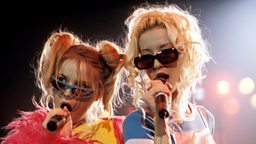
Hailed with typical understatement by Melody Maker as “the best girlpop duo in the history of the world”, Plumstead duo Shampoo were riot grrrls gone pop, the missing link between the Sex Pistols and the Spice Girls - they even foreshadowed the latter’s arrival two years later with a song called Girl Power. Except Shampoo's tunes didn't have the same impact as their attitude. Trouble became one of the summer's biggest earworms, reaching No. 11 in 1994, but ultimately they had to content themselves with briefly being big in Japan before disappearing off the face of the earth. Uh-oh!
3. Everyone going Irish (or Bulgarian or Brazilian) during the 1994 World Cup
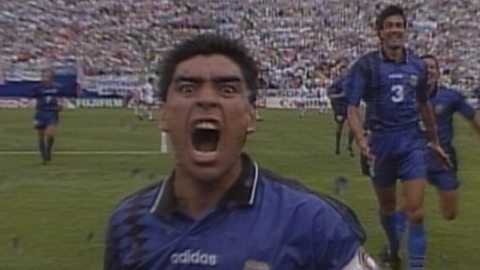
6 Music's 1994 Day: Best goals from USA '94
6 Music's 1994 Day: Best goals from USA '94
Having almost reached the final of the previous World Cup, the English football team went from heroes to zeroes by failing to even qualify for the 1994 tournament. Scotland, Wales and Northern Ireland proved equally hapless, so come the beginning of June everyone in Britain was suddenly discovering a long-lost Irish grandparent in order to justify supporting the boys in green - a not dissimilar process to that which saw Bexley-born Andy Townsend turning out for the Republic.
At first, our boys (the Irish) did us proud by routing Italy 1-0 in New Jersey. But then they lost in the second round to Holland, and only the schadenfreude of Germany’s defeat to Bulgaria kept us interested in the tournament. Ultimately it was a World Cup of missed penalties: Diana Ross’s infamous shocker in the opening ceremony, and Roberto Baggio’s blooter in the final shootout that handed the trophy to a functional Brazil side.
4. Stiltskin’s denim-assisted No. 1
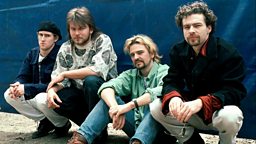
Re-releases of The Clash’s Should I Stay or Should I Go and Steve Miller Band’s The Joker had previously hit No. 1 after appearing in Levi’s commercials, so in 1994 the jeans giant decided to see if they could do the same for a new, unknown band.
Stiltskin were manufactured Scottish rockers sticking closely to Nirvana’s quiet-loud formula. Nonetheless the Pygmalion-style experiment worked, with the TV ad exposure enough to send Inside to the top of the charts, enshrining Stiltskin as grunge’s biggest one-hit wonders.
The trick was repeated a couple of years later with Babylon Zoo's Spaceman.
5. Even Wet Wet Wet got sick of Wet Wet Wet
[Warning: Third-party content may contain ads]
For the entire summer of 1994, Scottish popsters Wet Wet Wet had the UK singles chart on lockdown with their cover of The Troggs’ Love Is All Around. After 15 weeks at No 1, even the band themselves were fed up with hearing the song, so deleted the single from sale, thus preventing them from equaling Bryan Adams’ record for weeks at the top.
Much of Love Is All Around’s popularity stemmed from its appearance in the wildly popular Four Weddings and a Funeral, a film that seemed to hypnotise the country with a reductive stereotype of Britishness - emotionally repressed but ultimately jolly nice - that has sustained Hugh Grant’s career to this day.
6. Alan Partridge’s fashion line
[Warning: Third-party content may contain ads]
By 1994, Alan Partridge was well on his way to achieving his aim of TV ubiquity. He had The Day Today’s sports coverage sewn up (“eat my goal!”) and was host of his own primetime chat show, Knowing Me Knowing You. He even unveiled his own fashion line, A Partridge in Paris. Key pieces included a canary yellow shirt paired with horizon blue stay-creased action slacks and tan stringback driving gloves (a look he dubbed “cruiser arriviste”) and a three-piece short suit in “strolling pastel”.
7. The Internet vs CD-ROMs
1994 was the year that the World Wide Web really took off, with Amazon, Yahoo (originally called the less snappier Jerry and David's guide to the World Wide Web) and the Electronic Telegraph (the first British newspaper website) all launching online. Even the BBC published its first webpage, to accompany short-lived magazine show The Net.
But the volume of trustworthy news sites was already hugely outweighed by timewasting nonsense like The Amazing FishCam, providing a live feed from a tropical fishtank that updated once a minute. The truth is that most of us weren’t yet online, so had to make do with CD-ROMs - disappointing ‘interactive’ magazines that took ages to load a few cursory videos.
8. Pulp Fiction’s postmodern dance moves
[Warning: Third-party content may contain ads]
By the early 90s, the idea of dancing in unison to Oops Upside Your Head or the latest Black Lace number had become unforgivably naff. Unless you count the ‘big fish, little fish, cardboard box’ move ubiquitous at raves, it was all about doing your own thing - putting your hands in the air like you just didn’t care, or frugging earnestly to grunge.
But in 1994, Whigfield’s Saturday Night and the turbocharged charleston of novelty hit Doop by Doop saw the song-specific dance routine make an ironic return. And following Uma Thurman and John Travolta’s memorable turn in Pulp Fiction, suddenly clubs across the land were full of people drawing Vs across their eyes and pretending to swim around the dancefloor.
9. Huffty on The Word
Although it was nearing the end of its lifespan, anarchic late-night Channel 4 show The Word was still essential viewing in 1994, thanks to Oasis’s TV debut, Mark Lamarr baiting MC Hammer, and Huffty’s singular presenting style. Not many programmes would take a chance on a shaven-headed Geordie youth worker with no previous TV experience, but what Huffty lacked in slickness she made up for in enthusiasm. Dani Behr might have been a (marginally) more coherent interviewer but she never shouted “lesbian power” over the end credits.
10. Public Enemy’s pun pile-up
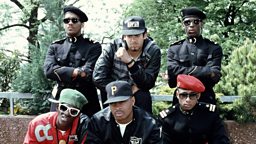
Legendary rap troupe Public Enemy rocked the world with their incendiary albums It Takes a Nation of Millions to Hold Us Back and Fear of a Black Planet, but by the mid-90s it could be argued they’d gone off the boil a bit, evidenced by the title of their 1994 effort Muse Sick-n-Hour Mess Age, a multiple pun pile-up that would make even Gyles Brandreth blush.
11. Studio hysteria on Don’t Forget Your Toothbrush

Between his stints fronting The Big Breakfast and the Radio 1 Breakfast Show, Chris Evans devised and hosted Don’t Forget Your Toothbrush, a Saturday night gameshow that bundled winning contestants off on holiday directly at the end of the show. It was a conceit that generated unprecedented levels of hysteria in the studio, not least on the occasion when they revealed they were sending the entire audience on a coach trip to EuroDisney. Suddenly the atmosphere was something akin to the away end when your team's just scored a last minute winner. The only person not going completely wild was the somewhat perplexed studio guest, Barry White. Only in 1994.










